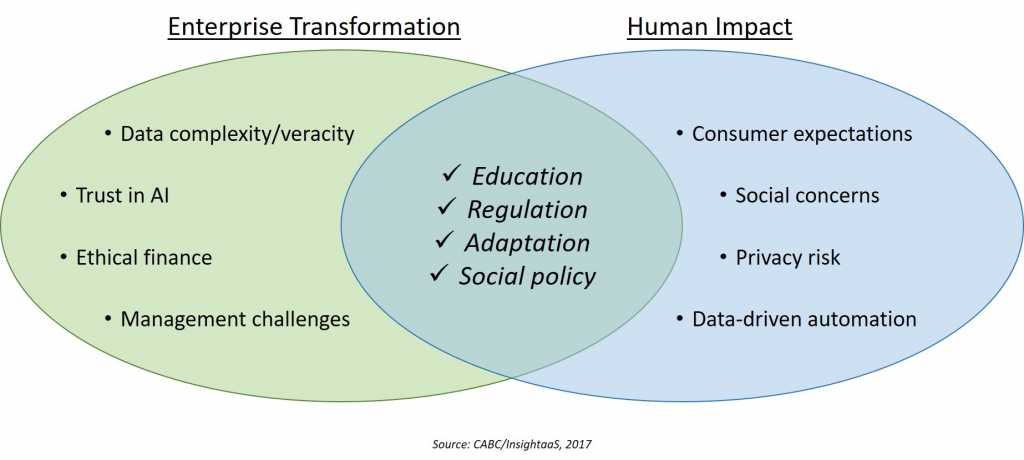New solutions to support the capture, storage and integration of massive data sets, combined with progress in algorithmic modelling are delivering new levels of insight across an ever-widening range of business, industrial, research and consumer applications. Driven by sensing and social technologies, the near-ubiquity of data has led to advances in algorithmic investigation, while tools for data visualization and natural language processing are easing access to information, helping to establish AI and analytics as a key means to uncovering value in business and convenience in personal life. But there’s a darker side to the analytics revolution: when used irresponsibly, or without appropriate security and governance in place, at best, AI and other advanced solutions can result in spurious conclusions – a poor basis for business decision making – and at worst, they can introduce social abuses including encroachment on privacy, unfair treatment of individuals, the marginalization of particular groups, and the relentless goose step towards wholesale artificial, as opposed to augmented, intelligence.
To address these challenges, the Canadian Analytics Business Coalition (CABC) has released a new report: AI and Advanced Analytics: Connecting Culture, Ethics and Society in a Machine Age. Based on expert input offered by 10 analytics practitioners and theorists from public and private sector organizations, the report represents a two-part investigation into the development of best practices in the use of advanced analytics aimed at the achievement of business benefit and social good. The first section of the report focuses on steps needed to support creation of a data-driven culture that can transform the enterprise, while the second section outlines the social consequences of extensive (mis)use of analytics: at the intersection of these two perspectives lie activities that can help to mitigate the potential for negative impacts of technology deployment. As Figure 1. from the report suggests, with regulation, adaptation, social policy and education, we can negotiate the spaces between business exploitation of advanced analytics for competitive advantage, and an individual’s interest in the ability/right to safe and open use of analytics-driven tech for new, personalized service delivery.
Figure 1. Challenge and opportunity in use of Big Data and advanced analytics

In building the business case for advanced analytics, the CABC Social and Cultural Impacts of Advanced Analytics working group has outlined a richness of technology adoption drivers. Sustaining competitive advantage, creating new customer insights, efficiency improvements, workforce optimization, R&D innovation, for example, are key benefits that the enterprise can look forward to. For consumers, the outcomes may be more mixed: as noted in the report, there will be “winners and losers on both sides of the ledger in the deployment of advanced analytics.” Winners will gain access to new, more personalized products and services, potential cost savings, and better use of public resources and increased public safety, but at what cost? The potential for loss of privacy, issues of subjective truth (if an analytics query discovers that the majority of people who take dancing classes also like mayonnaise, does the dance company develop marketing that focuses on mayonnaise?), and questions of fairness in the use of analytics models that may disadvantage individuals or social groups need to be on our social radar.
Enterprise transformation
But with strategic consideration of critical issues in the use of AI and other analytics tools, many of the potential practitioner mine fields can be avoided, leading to enterprise transformation. In the report, the working group has described six paths to cultural transition that can drive change – or not, depending on how analytics are implemented and positioned within the organization:
- Data-driven decisioning – the shift from gut instinct to empirical reasoning is most effective when contextual oversight by a human is retained
- Democratization of data – virtually all roles within the organization can benefit from data insights, but not all individuals are equipped to develop models or to benefit from complex report outputs
- Data complexity/data veracity – data is ubiquitous, but must be managed appropriately to ensure it does not deliver ‘fake news’
- Interpretation of results – analyzing the results of complex data queries is best left to mathematical or statistical experts who understand issues of significance, margin of error, etc. and how these can influence conclusions
- Fine tuning organizational structures – governance and policy around data sourcing, stewardship and use are especially critical in advanced analytics deployment, and will vary with the research application. Establishment of a CoE can help.
- Data and AI trust – AI as a Service and the advance of self-learning algorithms will challenge organizations as the source of bias or other issues will not be transparent to the technology user. However, organizations will need to ensure they have a way to “unpack” an algorithm to develop internal confidence in analytics reporting – and public trust in the enterprise.
Social concerns
Establishing enterprise trust is a moving target today as social concerns around the use of personal data and the legislation that reflects societal expectations are both evolving. In the report, the working group’s position that individuals, institutions, business and government all share responsibility for shaping the social norms and business practices that will support the development of a healthy, stable polity that can thrive in a machine age is clear. But responsible leverage of Big Data and analytics will entail education on a range of topics. In the report, focus was placed on building awareness of questions of data ownership, the trade off between consumer demand for instant-on, personalized services and loss of privacy, the emergence of bias or skewed data analysis, shifting notions of personal information, and the impact of growing AI/robotic displacement of white and blue-collar workers.
Report Release: Meetup at Workhaus

AI and Advanced Analytics: Connecting Culture, Ethics, Society in a Machine Age was officially launched on May 29th, at a meetup hosted by Workhaus at its downtown Toronto co work space. At the session, lead author of the report, Mary Allen, introduced InsightaaS-led community activities to a best-ever meetup audience of 80 or so analytics enthusiasts. To provide context for discussion of ethical issues that are emerging around the use of advanced analytics, Allen welcomed ‘spotlight presenter’ Tyler Schnoebelen, principal product manager, at Toronto-based platform provider integrate.ai who delivered a deep, but highly entertaining dive into the ongoing requirement for human oversight of AI, entitled the “Ethics of Everybody Else.”
Tyler’s talk was followed by a panel discussion in which Allen led members of the CABC Social and Cultural Impacts of Advanced Analytics working group, including Victor Garcia, managing director, ABCLive and adjunct professor, Schulich School of Business, Stephen Giles, director, data maturity, Dimensional Strategies, Travis McTeer, director, data and analytics, GoodLife Fitness and Jamie McDougall, VP, BI & analytics, Gore Mutual through an exploration of key themes co-developed by panelists and other members of the working group for the report.

Sponsors and working group
Creation of CABC reports is underwritten by the community’s corporate and individual sponsors. Corporate sponsors include CenturyLink, Cisco, Cogeco Peer 1, CloudOps, Information Builders, Ingram Micro, Avaya, Schneider Electric, Dimensional Strategies Inc., Twelvedot, TA Networks, TIG, ThinkOn and ProServe IT.
InsightaaS and the CABC would like to recognize the working group members whose insight and expertise are the source of AI and Advanced Analytics: Connecting Culture, Ethics, Society in a Machine Age exceptional depth and quality (note – links require that you are logged into LinkedIn):
Dean McKeown, Associate Director, Master of Management Analytics, Queen’s University
Jamie McDougall, VP, Business Intelligence & Analytics, Gore Mutual
Travis McTeer, Director of Data and Analytics at GoodLife Fitness
Stephen GIles, Director of Data Maturity, Dimensional Strategies Inc.
Don Sheppard, Consultant on emerging technology, standards advisor, author/writer
Mathew Gancarz, Manager of Information Technology and Operations, de Souza Institute
Paul Gragtmans, Principal, Display5
Victor Garcia, Managing Director, ABCLive, and Adjunct Professor, Schulich School of Business, York University, Master of Sciences-Analytics program
The report also benefits from expert contributions from:
Alex Sirota, Director, NewPath Consulting
Carl Aspler, Organizational change expert
InsightaaS thanks each of these thought leaders for their contributions to AI and Advanced Analytics: Connecting Culture, Ethics, Society in a Machine Age.
Obtaining access to the report
Like all reports produced by the CABC and its sister communities (IoT Coalition Canada, Toronto Cloud Business Coalition, and Vision2Value (V2V): The Economics of Data), AI and Advanced Analytics: Connecting Culture, Ethics, Society in a Machine Age is available to all interested professionals. Each of the working group sponsors and members listed above is encouraged to distribute AI and Advanced Analytics: Connecting Culture, Ethics, Society in a Machine Age to their peer and contact networks. The report is also available from InsightaaS: please follow this link and use the code IaaSpoint.








